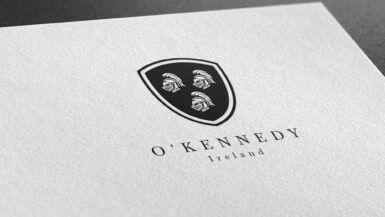The surname White is of Anglo-Saxon origin, and it emerged in the British Isles during the early Middle Ages. However, in the context of Irish history, the surname, often written as ‘de Faoite’ in Irish Gaelic, has been present on the Emerald Isle for centuries and carries its distinct narrative.
Etymology and Meaning
The surname White primarily derives from the Middle English word ‘whit,’ meaning ‘white.’ It was often given as a nickname to individuals with light or fair hair, or pale complexions. In some instances, it was used to denote a person who habitually wore white clothing, such as a baker or miller.
Earliest Known Usage
In Ireland, the White surname was first used in county Limerick, where the family held a family seat from ancient times. The Whites of Limerick descended from William de Faoite, who arrived in Ireland in the wake of the Anglo-Norman invasion of the 12th century.
Geographic Distribution
The White surname can be found throughout Ireland, but it’s especially prevalent in counties Clare, Limerick, and Wexford. However, due to emigration, bearers of the White surname are found worldwide, notably in the United States, Canada, Australia, and the United Kingdom.
Original Geographic Location
The original geographic location of the White surname in Ireland is primarily in the counties of Limerick, Clare, and Wexford. The Whites of Limerick are considered the oldest branch of this family in Ireland.
Migration Patterns
Like many Irish families, the Whites experienced significant migration. Economic hardships, particularly the Great Famine of the mid-19th century, prompted many Whites to emigrate to North America, Australia, and other parts of the British Empire.
Historical Context
Notable Historical Events
In Irish history, bearers of the White surname have been associated with numerous significant events. A notable bearer, Thomas White, was involved in the Irish Confederation’s rebellion during the mid-17th century.
Involvement in Key Moments in History
One famous bearer, Jack White, co-founded the Irish Citizen Army during the early 20th century, a paramilitary group that played a vital role in the 1916 Easter Rising.
Notable Irish Bearers of the Surname
Famous Individuals
Famous individuals bearing the White surname in Ireland include James Whiteside, a prominent 19th-century lawyer and politician, and Luke White, a wealthy bibliophile and patron of the arts during the late 18th and early 19th centuries.
Influential Figures
In modern times, we have singer-songwriter Jimmy White and professional snooker player Michael White.
Variations of the Surname
Spelling Variations
The White surname has several spelling variations due to phonetic Anglicization from the Gaelic version. Some of these variations include Whyte, Wight, Witt, and others.
Regional Differences
Regionally in Ireland, the White surname is often recorded as de Faoite, especially in Gaelic-speaking areas. Additionally, the pronunciation can vary in different parts of the country.
Current Statistics and Distribution
Frequency and Global Distribution
White is a common surname throughout Ireland and remains frequent in the original counties of Limerick, Clare, and Wexford. Due to historical emigration, it is also widespread in countries such as the United States, Canada, Australia, and the United Kingdom.
Changes Over Time
The distribution of the White surname has evolved over time due to factors such as migration, cultural assimilation, and spelling alterations. Today, it continues to be a prominent surname within the Irish diaspora worldwide.
Family Coat of Arms
The White family coat of arms is a silver shield with three red roses. The family motto is “Pro Aris et Focis,” meaning “For our altars and our homes.” However, it’s important to remember that coats of arms belong to individual people, not families or surnames, and may not apply to all bearers of the surname White.






Leave a reply